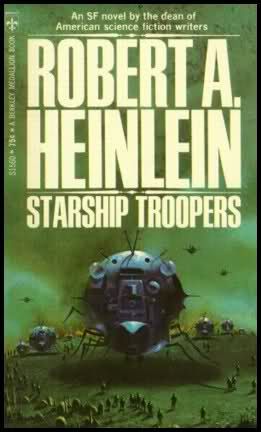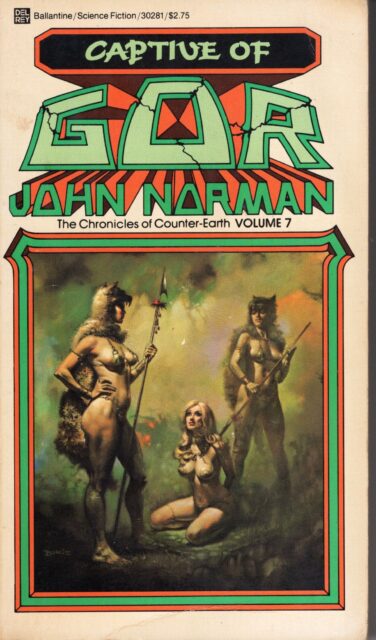Heinlein is still my favourite science fiction author, and Starship Troopers was one of the first of his books that I read when I was in Grade 5. I still love the book and re-read it every few years … unlike a lot of authors’ works, Heinlein’s writing holds up well decades after being published. John Carter is also a fan of Starship Troopers, but not the movie adaptation (which I managed to avoid seeing). He starts out this post with an updated treatment of the opening scenes of the book for an honest screenplay, which I think would work very well:
And that is how the cinematic adaptation of Robert A. Heinlein’s seminal military-SF masterpiece Starship Troopers should have started: with all of the pathos, action, and emotional intensity of the novel’s famous first chapter. I’ve taken extensive liberties with the source material, but in my head, this is what the first ten minutes or so of the movie would look like. If it had been a good movie.
But it was not.
Instead, director Paul Verhoeven served up Saved By the Bugs, a cheesy 90’s high-school drama cum college movie which felt more like Beverly Hills 90210 than Full Metal Jacket, liberally slathered with unnecessary sexual drama and drenched in hamfisted satire of the source material, with all of the coolest elements – the powered armour, the orbital drops, the backpack nukes – conspicuously stripped out.
I’ve read that Verhoeven claimed the powered armour was left out for budgetary reasons, but this has always struck me as a weak excuse. The budget had enough for CGI bugs and CGI spaceships, so CGI powered armour wouldn’t have stretched the budget at all. That’s like Blizzard saying that after they animated the Zerg, they didn’t have enough left over for the Terrans. Utterly absurd.
That’s to say nothing of the gaudy high-tech training facility the film set the boot camp scenes in, which was an utterly superfluous waste of money. In the novel, the boot camp was deliberately low-tech: some tents out in the middle of a grassy field a hundred miles from nowhere. The recruits didn’t learn how to use high-tech weapons until they’d learned to make their entire body, their entire being, into weapons; that’s the origin of the famous scene in the movie in which Sergeant Zim chucks a knife through Ace’s hand (in the book, Zim merely describes the possibility of doing this as an example of how a warrior armed with a low-tech weapon can disable someone with a high-tech weapon: can’t use the high-tech weapon if you can’t use your hand. Zim doesn’t actually stab one of his own troops). Graduation includes a fun exercise where they’re dropped naked and alone in the middle of the Rockies, with the objective of making it back to civilization alive; recruits were expected to hunt their own food and make their own shelter, using whatever tools they could improvise from the natural environment. They were expected to be just as dangerous as cavemen as they were wearing powered armour. That’s one of the many scenes from the novel which is sadly missing from Verhoeven’s movie.
You may be getting the idea that I am not a big fan of Verhoeven’s execrable adaptation, and you would be correct. Some of you may be surprised by this. I expect many readers have only seen the movie, and of those who have read the book, the younger readers probably saw the movie first, and have a nostalgic attachment to it.
Look, you might say this is personal for me.
I was ecstatic when I found out Starship Troopers was being brought to the silver screen. This was, by far, my favourite science-fiction novel of all time. Not only was it the pioneering archetype for the military science-fiction subgenre, but it introduced at least three novel concepts that have since become tropes: powered armour, which went on to inspire half of Japanese anime, along with Ironman, the Adeptus Astartes of Warhammer 40K, the Terran faction in Starcraft, Halo‘s Spartans, the Battletech games, and by now makes an appearance in practically every science-fiction universe you can name; the orbital drop, in which armoured space marines are fired down to the surface in drop capsules like living bullets, which also appears in 40K and Halo, and plays a prominent role in Pierce Brown’s Red Rising series by way of the planet-breaking Iron Rain tactic; and the insectoid alien hive mind, seen also in 40K‘s Tyrannids, Starcraft‘s Zerg, and numerous lesser-known works. As if this creative efflorescence was not enough, Heinlein’s novel grappled with the weighty issue of the moral philosophy of organized violence and its relationship to human politics in a deeply serious way, using the coming-of-age story of a young man turned soldier during an existential war for the survival of the human species as the dramatic frame for the philosophical exposition. Heinlein did all of this in just over 80,000 words – a short, fun read accessible to a bright ten-year-old.
The travesty that confronted me therefore filled me with a hot rage.
The reason Verhoeven left out the powered armour is quite simple: it was too cool, and his intention was not to make the Mobile Infantry look cool. His intention was to ridicule the philosophical position that Heinlein put forward in the book: that violence is at the heart of the political, and cultures – or species – who forget this, get rolled by the ones who don’t.
Liberals have been appalled by Starship Troopers since it was published, considering it a work of warmongering crypto-fascist apologetics, with very light emphasis on the “crypto”. They’ve been somewhat baffled by it, as well: how could the man who wrote the hippie free love bible Stranger in a Strange Land, or the libertarian anti-state manifesto The Moon is a Harsh Mistress, argue so compellingly for a society in which “service guarantees citizenship”, thereby ensuring that political power forever remains firmly in the hands of the military (or, rather, veterans of the military)? What sort of right-wing maniac gleefully smashes the beloved idol of “violence never solves anything” to replace it with the dictum that nothing in history has solved so many issues so decisively as violence; insists that communism isn’t only a bad thing but wholly unsuited to human beings (although very well-suited to insectoid hive-mind aliens); and insinuates that letting the scientists run society “rationally” according to the principles of managerial technocracy would bring about its ruin?
Verhoeven, as a good liberal, therefore set out to make the novel’s arguments look ridiculous.










